Mufasa: The Lion King, 2024.
Directed by Barry Jenkins.
Featuring the voice talents of Aaron Pierre, Kelvin Harrison Jr., Tiffany Boone, Kagiso Lediga, Preston Nyman, Mads Mikkelsen, Thandiwe Newton, Lennie James, Anika Noni Rose, Keith David, John Kani, Seth Rogen, Billy Eichner, Donald Glover, Blue Ivy Carter, Beyoncé, Braelyn Rankins, Theo Somolu, Folake Olowofoyeku, Joanna Jones, Thuso Mbedu, Sheila Atim, Abdul Salis, Dominique Jennings, Derrick L. McMillon, Maestro Harrell, AJ Beckles, and David S. Lee.
SYNOPSIS:
Mufasa, a cub lost and alone, meets a sympathetic lion named Taka, the heir to a royal bloodline. The chance meeting sets in motion an expansive journey of a group of misfits searching for their destiny.
Mufasa: The Lion King opens with an on-screen graphic stating “in remembrance of James Earl Jones,” (who famously voiced the titular lion king in the original animated feature), a decision that comes across as corporately dubious (considering Disney was committed to making this movie long before he died) and as a manipulative tactic to get the viewer on the film’s side before this rushed, overstuffed, weightless, joyless, nostalgia-pandering photorealism CGI prequel unfolds. It’s as if a Disney executive thinks that people won’t dare call this film out for what it is if it appeals to the beloved and iconic status, not to mention the recent passing of James Earl Jones. Save that for the ending credits like practically every other film in existence paying tribute does (I’ve never seen it done at the beginning before, and if I have, I forget since it probably wasn’t as questionable as it is here.)
In the interest of fairness, there is the possibility that this creative choice wouldn’t have gone down so sourly if the quality of the film was passable. Directed by Barry Jenkins (something is wrong with the entire sub-genre of “live-action CGI” when the filmmaker behind Moonlight can’t make it work despite directing his ass off, to the point of deploying Steadicam shots of animals running and chasing one another across various landscapes), what’s here is an unwieldy tale that wants to explore a young orphaned Mufasa’s (now voiced by Rebel Ridge breakout action star Aaron Pierre) rise in nobility and kingship, the forming of the Pride Lands, and the falling out between him and nonbiological brother Taka (voiced by Kelvin Harrison Jr., a reliable actor that distractingly doesn’t sound anything like the character from either version of The Lion King that he becomes), while also functioning under a storybook structure that sees Rafiki (voiced by John Kani) painting this visual picture to Simba (voiced by Donald Glover) and Nala’s (voiced by Beyoncé) cub daughter Kiara (voiced by the latter’s daughter Blue Ivy Carter, because why not get some nepotism in there too.)
The storybook element would be fine if it were limited to the opening sequence (again, like most other movies utilizing this narrative device) and even forgivable if it were one or two interjections mid-story. Disney (yes, this is a film directed by Barry Jenkins from a screenplay by Jeff Nathanson, but let’s not kid ourselves about where some of these directions are coming from) wants constant interruptions. The interjecting banter is almost exclusively from fan-favorite characters Timon and Pumbaa (voiced by the returning Billy Eichner and Seth Rogen), taking every possible opportunity to pander to viewers (at one point singing a slightly different version of Hakuna Matata) or make awkward meta references such as when the dimwitted warthog briefly expresses jealousy that his lifelong meerkat companion saw the Broadway stage production of The Lion King without him.
Such a level of eye-rolling fan service isn’t necessarily surprising. However, one does get the impression that the story Barry Jenkins and Jeff Nathanson are more interested in telling, which is an inverse to how the wiser adult Mufasa saw life, leadership roles, and the circle of life, is a mildly compelling starting point that gets lost and muddled within everything else happening. The amount of narrative excess includes an origin story to the origin story, focusing on the childhood of Mufasa and the tragic death of his parents (something that cheaply feels visually and emotionally similar to Mufasa’s own death in The Lion King, just to give one an idea of how lazy some of this is while also containing nowhere near the same impact) while also providing a window into Taka’s upbringing which includes a perpetually sleepy father who is content having the women do all the real work, also asserting that outsiders are not allowed and to be killed. Mufasa is allowed into the group, though, by some amusingly lazy shorthand that sees him beating Taka in a race.
Due to the severe flood that took Mufasa’s parents, he has an overwhelming fear of water. As the film goes on, it’s also evident that his fears, despite having sound morals and advanced smelling and tracking of other jungle animals, have him running away from destiny. The bravery isn’t there yet. When he and Taka are older (there are numerous time jumps here handled without the grace of the classic story), some tragedy befalls the latter’s parents (you get double the childhood trauma for the prequel, something the movie weirdly jokes about), they meet and befriend Sarabi (voiced by Tiffany Boone), with the former playing down his abilities and serving as a glorified dating wingman to his brother. A noteworthy dynamic between Mufasa and Taka is that the latter always wanted a brother. Well, he got one, and this movie has a lame love triangle; among other reasons, he begins to feel betrayed by Mufasa.
This drama plays out with a pack of white lions hunting them down and taking over whatever territory they desire. Led by Kiros (voiced by Mads Mikkelsen), he and his grunts (nowhere near as interesting or funny as the hyena trio from the original animated feature, partially because this film takes itself far too seriously) are underdeveloped with generic motives. However, Kiros’ mindset plays into the inverse perception of the circle of life, even getting the only memorable song here, which is a villainous deconstruction of that philosophy. As for the rest of the songs, not even Lin-Manuel Miranda can make this film come alive. Although his stamp is over the songs and lyrics, the story here is so lackluster that his penchant for leaning into the soaring, emotional bits is mostly noticeably absent, aside from one number.
More characters are also crammed in here, getting mini-origin stories, such as a younger Rafiki (voiced by Kagiso Lediga) and Zasu (voiced by Preston Nyman), among the onslaught of new characters that aren’t fleshed out or make an impression. In the case of Rafiki, it is tolerable since he seems to be the one character even these photorealistic CGI versions get right, elevated by solid voice acting that evokes the spirit and sage smarts of the character.
Still, between the present-day scenes, central flashback story, abundant characters, and every plot beat flurried through (a miraculous feat given that the movie is also overly long at 2 hours) without any emotion, Mufasa: The Lion King is dire. Even its moments of spectacle come across like an awkward tech demo, boasting so much 3D slow-motion one might wonder if Paul W.S. Anderson secretly directed it. Nevertheless, Barry Jenkins did, and I sincerely hope the paycheck was worth it and that tinkering with such technology was creatively refreshing and fulfilling. If nothing else, the overworked, impressive team of visual effects artists brought slightly more life and personality to the character models under his direction. The “remembrance” of James Earl Jones deserves better.
Flickering Myth Rating – Film: ★ ★ / Movie: ★ ★
Robert Kojder is a member of the Chicago Film Critics Association and the Critics Choice Association. He is also the Flickering Myth Reviews Editor. Check here for new reviews, follow my Twitter or Letterboxd, or email me at MetalGearSolid719@gmail.com















